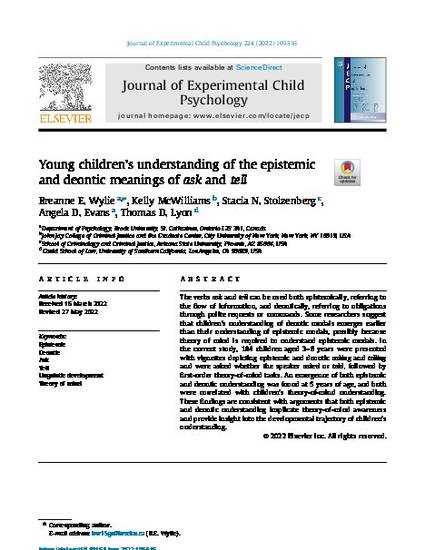
Article
97. Young children’s understanding of the epistemic and deontic meanings of ask and tell.
Journal of Experimental Child Psychology
(2022)
Abstract
The verbs ask and tell can be used both epistemically, referring to the flow of information, or deontically, referring to obligations through polite requests or commands. Some researchers suggest that children’s understanding of deontic modals emerges earlier than their understanding of epistemic modals, possibly because theory of mind is required to understand epistemic modals. In the current study, 184 children ages 3- to 6- years were presented with vignettes depicting epistemic and deontic asking and telling and were asked whether the speaker asked or told, followed by first-order theory of mind tasks. An emergence of both epistemic and deontic understanding was found at 5 years of age, and both were correlated with children’s theory of mind understanding. These findings are consistent with arguments that both epistemic and deontic understanding implicate theory of mind awareness, and provide insight into the developmental trajectory of children’s understanding.
Keywords
- Child abuse,
- Child neglect,
- Child testimony,
- child forensic interview,
- epistemic,
- deontic,
- linguistic development,
- theory of mind,
- ask and tell
Disciplines
Publication Date
Summer July 7, 2022
DOI
https://doi.org/10.1016/j.jecp.2022.105516
Citation Information
Wylie, B.A., McWilliams, K., Stolzenberg, S.N., Evans, A.D., & Lyon, T.D. (2022). Young children’s understanding of the epistemic and deontic meanings of ask and tell. Journal of Experimental Child Psychology, 224, 105516.
